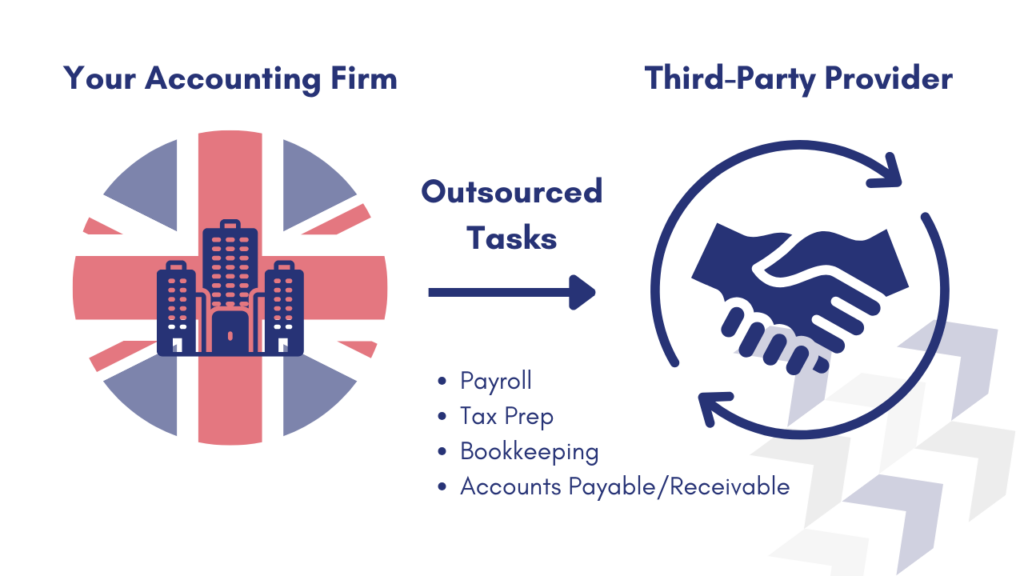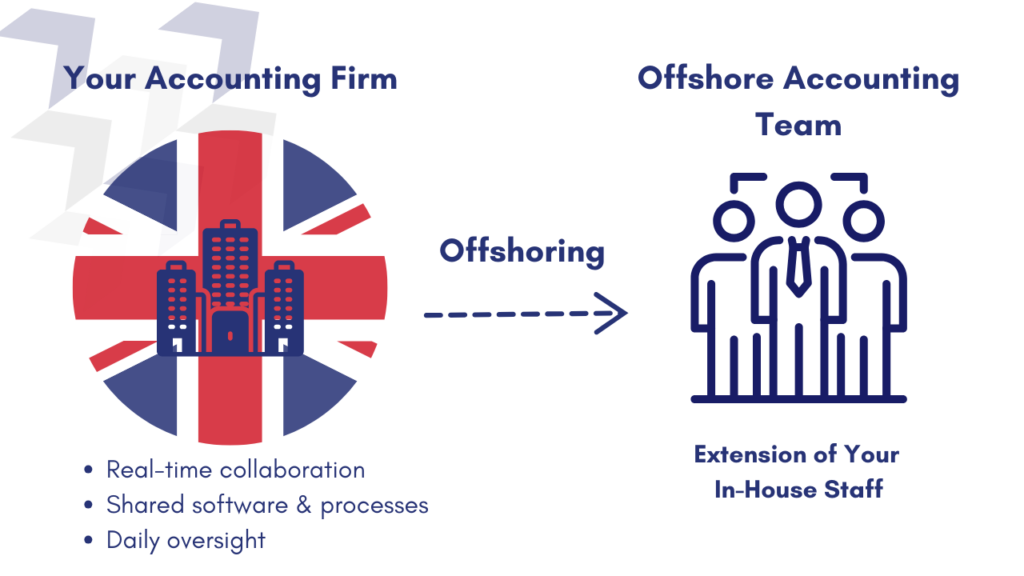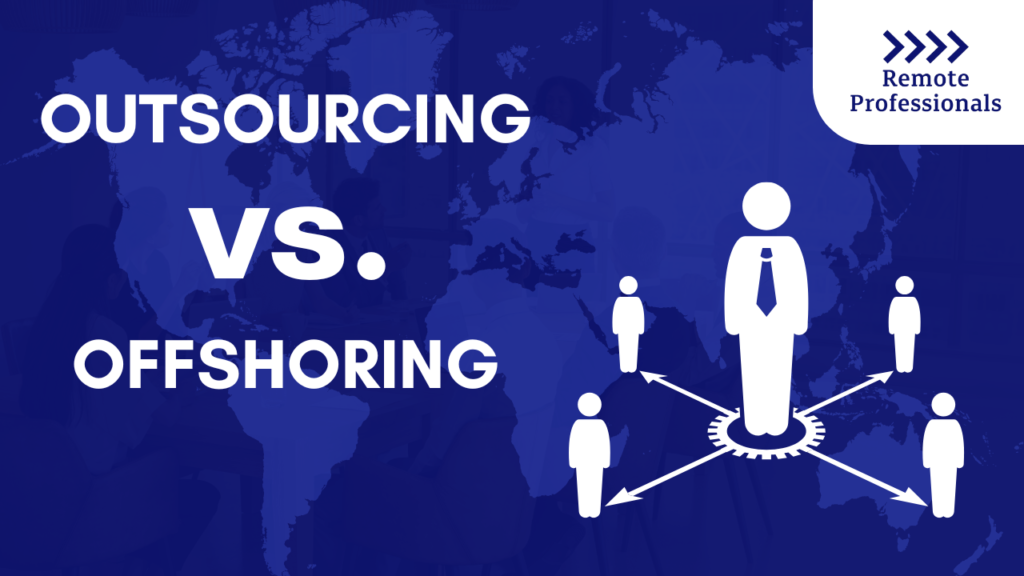Table of Contents
Offshoring vs. Outsourcing
Struggling to scale your UK accounting practice? Discover how offshoring and outsourcing compare and pick the right model to fuel your growth.
Why It Matters for UK Accounting Firms
UK-based accounting firms face stiff competition and that pressure ramps up during
tax season and other busy periods. Many firms look to outsourcing or offshoring of their accounting work to take on more clients, reduce operational costs, access specialised skills, and scale without massive overhead.
- Outsourcing: A quick way to delegate certain tasks to external providers, though with less daily control.
- Offshoring: Building a remote team that works within your systems for tighter oversight, better scalability, and bigger long-term savings.
This guide explores how each model supports growth, potential pitfalls, and benefits with some insight into different aspects of each model specifically for UK accounting firms.

What Is Outsourcing in Accounting?
Outsourcing refers to contracting specific accounting tasks to a third-party provider. Whether they’re in the UK or abroad, they handle the work in their own systems and processes, freeing up your time for more strategic, growth-oriented tasks in-house.
Typical Outsourced Tasks:
- Payroll Processing
- Tax Preparation (e.g., personal tax returns, VAT)
- Bookkeeping for smaller clients
- Accounts Payable/Receivable
Key Advantages for UK Firms:
1. Immediate Expertise
No lengthy hiring or training, ideal if you need quick solutions to meet growth demands.
2. Reduced Overhead
Pay only for completed services; no added office or benefits costs.
3. Flexible Scaling (Short-Term)
Ramp up during peak times (e.g., tax season), scale down in off-peak seasons, ensuring you don’t over-hire.
Potential Downsides:
1. Administrative Complexity
Limited oversight of the outsourced team’s daily processes or quality checks.
2. Integration Challenges
Because outsourced teams often operate in their own systems, syncing data and processes may be less seamless.
3. Transparency and Quality:
You rely heavily on the partner’s quality controls and communication channels.

More Info Around Outsourcing:
Outsourcing vs Resourcing
Delve into the differences between outsourcing and resourcing for accounting firms. This guide helps you assess which model aligns best with your firm’s objectives and operational style.
Problems with Traditional Outsourcing
Traditional outsourcing offers benefits, but it isn’t always the perfect fit for accounting firms. Discover the most common outsourcing challenges and tips to overcome them, ensuring quality, security, and seamless collaboration.
What Is Offshoring in Accounting?
Offshoring means relocating some (or all) of your accounting functions to a remote team in another country but crucially, those remote accountants still operate in your firm’s infrastructure. This long–term, growth–focused approach is designed to expand your capacity without losing control.
Typical Offshored Tasks:
- Ongoing Bookkeeping & Management Accounts
- Financial Reporting & Year–End Finalization
- Complex Tax Compliance (Corporate, VAT, etc.)
- Audit Support & Financial Analysis
Key Advantages for UK Firms:
1. Full Control
Offshored staff follow your workflows and software, giving you daily oversight of quality and process—critical as you grow.
2. Deeper Integration
The remote team gradually becomes part of your company culture, meeting growth demands seamlessly.
3. Significant Cost Savings
Lower labour costs in certain countries help you invest the savings in other growth initiatives (e.g., client acquisition, additional services).
Potential Downsides:
1. Administrative Complexity
Setting up offshore operations can involve legal, HR, and compliance considerations in the new country.
2. Cultural Communication Barriers
Time-zone differences and language nuances can slow productivity if not managed properly.
3. Infrastructure Investment:
Depending on the model, you may need to invest in software, hardware, or additional security measures for your offshore team.

Key Differences: Outsourcing vs. Offshoring
While both outsourcing and offshoring can help UK accounting firms save costs and access specialized talent, they differ significantly in control, scalability, data security, and long-term growth potential. The table below offers a quick at-a-glance comparison.
Factor
Outsourcing
Offshoring
Process / Quality control
Standardised processes set by provider
Full control to run your own systems and maintain quality
Team continuity
May vary depending on provider
Same team members over time, building client familiarity
Scalability
Limited to provider capacity
Scales flexibly as your business grows
Flexibility
High flexibility for ad hoc or short-term needs
Flexibility to scale and shape team structure over time
Time saving
Saves time initially by removing need to train or manage
Saves time long-term through reduced rework and retained team knowledge
Management
Fully managed by the outsourcer
Managed by you (with optional operational support)
Team structure
Work handled by a third-party firm
You build and oversee your own remote team
Cost
Lower than hiring locally
Often lower than outsourcing when scaled
Time to onboard
Quick setup
More involvement needed upfront
Best for
Firms needing project-based or overflow support for non-core tasks
Firms building long-term capacity and wanting full integration with their processes
Pros and cons
✅ Quick setup
✅ Minimal input
❌ Less control
❌ Variable quality
❌ Potential turnover
✅ High control
✅ Consistent team
✅ Stronger long-term ROI
❌ Requires more time
❌ Internal oversight to set up
*Both models can deliver cost savings and access to specialized skills, but the level of integration, control, and long-term scalability differ. If your firm values daily oversight and consistent in-house processes, offshoring likely offers greater benefits. For short-term or seasonal needs, outsourcing may be quicker and less complex to set up.
Key Growth Insight:
Outsourcing helps you handle sudden spikes in workload, but it’s less predictable for continuous scaling.
Offshoring is the preferred route if you’re planning steady, sustainable growth over multiple seasons or years.
How to Decide Between Outsourcing and Offshoring
Both outsourcing and offshoring offer unique advantages, from quick scalability to long-term cost savings. The right choice depends on various factors. Below are the key factors to consider before making your decision.
Timeframe (Short-Term vs. Long-Term)
- Short-Term → Outsourcing is typically simpler for project-based needs.
- Long-Term → Offshoring yields better consistency, cost savings, and team integration.
Budget & Cost Structure
- Immediate Cost Relief → Outsourcing (pay-per-service model).
- Investment for Growth → Offshoring requires initial setup but pays off over time
Data Security & Compliance
- If Handling Sensitive Client Data → Offshoring keeps data within your systems, ideal for GDPR compliance.
- Less Sensitive Tasks → Outsourcing might be adequate.
Level of Oversight & Control
- Hands-Off → Outsourcing providers manage their own staff and processes.
- Hands-On → Offshoring means you train and oversee your remote team directly.
Ultimately, outsourcing is best for short-term, project-based needs, while offshoring shines for long-term, integrated roles. Evaluating these factors timeframe, budget, security, and oversight will help you make a strategic choice that aligns with your firm’s growth objectives.
Common Mistakes to Avoid
Whether you choose outsourcing or offshoring, certain pitfalls can derail your progress. Below are the most common mistakes UK accounting firms make and how to prevent them.
Focusing Solely on Cost
- Risk: Ultra-low bids may signal subpar quality, poor communication, or hidden fees.
- Solution: Balance cost with relevant UK accounting expertise and a proven track record.
Vague Scope & KPIs
- Risk: Misaligned goals cause delays, rework, and dissatisfaction.
- Solution: Define deliverables, turnaround times, and quality metrics upfront (e.g., Service Level Agreements).
Weak Onboarding & Training
- Risk: External teams can’t meet your standards if they’re unclear on processes.
- Solution: Provide SOPs, checklists, or recorded training sessions.
Ignoring Cultural & Time-Zone Factors
- Risk: Communication gaps cause missed deadlines, frustration, or overlooked details.
- Solution: Set overlapping hours, invest in cultural alignment, and use real-time tools.
Underestimating Data Security
- Risk: GDPR non-compliance, potential data breaches, and reputational damage.
- Solution: Vet each provider’s security protocols; consider secure file-sharing and VPNs.
Lack of Ongoing Communication
- Risk: Small misunderstandings escalate, or important updates get lost.
- Solution: Schedule regular check-ins, track tasks in a project management tool, and maintain open communication channels.
No Contingency Plan
- Risk: If the relationship fails, you risk major service disruptions.
- Solution: Keep internal backups, document processes, and have alternative providers or staff.
By identifying these pitfalls early, you’ll set clear expectations, maintain strong communication, and protect your firm’s data. Ultimately, avoiding these mistakes will help you get the most out of outsourcing or offshoring without the usual growing pains.
Best Countries for Offshoring
Choosing the right offshoring destination can significantly impact talent quality, cost savings, and day-to-day collaboration. For UK accounting firms, factors like time-zone compatibility, English proficiency, and robust financial regulations play a key role. Here’s how South Africa compares to other popular options.
South Africa: A Top Choice for UK Accounting Firms
Time-Zone Alignment: Only 1–2 hours ahead of the UK, allowing near real-time collaboration.
High English Proficiency: Smooth communication is vital for detailed financial tasks.
Strong Regulatory Framework: Accounting standards align with IFRS and meet strict UK/EU requirements.
Skilled Workforce: Many professionals have direct experience with UK compliance and certifications.
Reliable Infrastructure:
Major cities like Johannesburg and Cape Town support stable power, internet, and modern business facilities.
Why It’s Superior for Growth: Minimal time-zone gap, solid English skills, and cultural alignment empower UK firms to integrate remote teams effortlessly without common issues like high turnover or major communication barriers.
The Philippines
Pro: Excellent English fluency and up to 70% labor cost savings.
Con: Significant time-zone difference (BST vs. Philippine Time), which can complicate real-time collaboration.
India
Pro: Massive finance and accounting talent pool, very low labor costs.
Con: High staff turnover, communication barriers, and time-zone gap also affects quick responses.
Other Options
Pro: Closer time-zone alignment, decent IFRS knowledge.
Con: Costs may be higher than Asian or African alternatives, and the talent pool can be smaller.
Step-by-Step Guide: Should You Outsource or Offshore?
Still not sure which model suits your firm best?
Use this quick decision flow to determine whether outsourcing or offshoring better aligns with your UK accounting practice and your growth goals.
1. Is the task core to your business?
No → Outsource. Free up in-house resources for more strategic, revenue-driving functions.
Yes → Proceed to the next question.
2. Do you want full control over processes and security?
No → Outsource. A reputable vendor can handle compliance and day-to-day management.
Yes → Offshore. Keep tasks in-house (i.e., your own systems) for stricter oversight.
3. Short-Term vs. Long-Term Needs
Short-Term → Outsourcing is simpler and more cost-effective for project-based or seasonal tasks.
Long-Term → Offshoring yields better consistency and long-term savings, especially for ongoing roles.
4. Evaluate Budget & Scalability
Tight Budget but Urgent Staffing? → Outsource. Pay per project or service without a large initial outlay.
Investment for Growth? → Offshore. Higher initial setup but significant cost advantages over time.
5. Data Security Concerns
High-Sensitivity (GDPR Compliance) → Offshore. Work stays in your systems, reducing external risk.
Low-Sensitivity → Outsourcing may suffice if you trust the provider’s security measures.
Making the Right Decision
After exploring both outsourcing and offshoring (along with their pros, cons, and best-use scenarios) it’s clear that each model offers unique benefits for UK accounting firms.
Outsourcing shines for short-term, project-based tasks or when you need immediate expertise without a lengthy setup.
Offshoring on the other hand, is ideal for long-term scalability, integrated processes, and cost-effectiveness over time.
Ultimately, if you value day-to-day control, consistent compliance with UK regulations, and stable, long-term staffing, offshoring is likely a better fit. If your firm primarily needs seasonal or ad-hoc support, outsourcing can offer a quicker, simpler solution.
Your Firm’s Needs
Best Choice
Why?
Short-term, project-based work
Outsourcing
Flexible and cost-effective for temporary or seasonal tasks, such as tax-season prep.
Long-term team integration
Offshoring
Greater control, consistent staffing, and long-term cost savings.
Limited budget but need quick staffing
Outsourcing
Pay per project or service without a long-term commitment.
Full process control & data security
Offshoring
Accountants work within your systems, ensuring compliance and data protection.
High-volume, recurring accounting work
Offshoring
More cost-efficient for continuous tasks like bookkeeping and financial reporting.
For UK accounting firms focused on sustained growth, offshoring typically provides deeper integration and a dedicated team that evolves with your firm. Meanwhile, outsourcing can fill immediate gaps, letting you adapt to market demands without overextending your resources.
Find Out What's Best For Your Firm
Unsure if outsourcing or offshoring fits your firm’s needs?
Our 60-second quiz will pinpoint which model aligns with your firm’s structure, accounting services, budget, and growth goals.
FAQs for UK Accounting Firms
Below are frequently asked questions about outsourcing and offshoring for UK accounting firms, along with quick answers to help you stay informed.
Primarily, long-term cost savings combined with full control over workflows and data security, especially relevant under UK laws.
South Africa offers minimal time-zone differences, strong English fluency, and lower staff turnover. India can be cheaper upfront, but often struggles with communication and turnover challenges.
Absolutely. Many UK firms adopt a hybrid model. They outsource routine or seasonal tasks (e.g., payroll, data entry) while offshoring core, long-term responsibilities (e.g., monthly bookkeeping, financial reporting) to maintain both flexibility and full control where it matters most.
Not at all. Small to mid-sized UK practices also benefit if they seek consistent scaling without massive in-house costs.
It depends on your timeframe and scope. Outsourcing can be cheaper up front for project-based or seasonal tasks. Offshoring generally requires a higher initial setup but brings greater long-term savings for ongoing roles, especially when you need full control over processes and data.
Yes, provided you enforce strong GDPR measures, use secure file-sharing systems, and carefully manage remote staff’s access.
Recurring, high-impact tasks like bookkeeping, management accounts, or auditing support. They form your firm’s backbone, so consistent quality and seamless integration is key.
Both models can support HMRC and Making Tax Digital requirements if the external team is well-trained in UK regulations. With offshoring, you have direct oversight to ensure compliance, while outsourcing requires you to trust the provider’s processes—so choose a partner experienced in UK tax law.
It varies, but expect 1–3 months for recruitment, training, and integration—longer if you need highly specialized roles. Outsourcing can be faster to initiate since you’re tapping into an existing provider’s staff, but you’ll have less direct control over day-to-day operations.
Many popular offshoring destinations—like South Africa or the Philippines—have strong English proficiency and familiarity with UK business culture. Clear communication protocols, overlap in working hours, and cultural awareness training can further minimize barriers.
Offshoring typically offers more consistency and control for high-level tasks requiring deeper integration. You can train your offshore team to follow exact standards and processes. Outsourcing might suffice for simpler or one-off specialized tasks, but less control can be a drawback.
Look for partners with proven experience in UK tax laws and compliance, strong references, robust security measures, and good communication protocols. Assess time-zone alignment, cultural fit, and the ability to scale as your accounting firm grows.
Still have questions about outsourcing or offshoring for your UK accounting firm?
Reach out to us or explore our blog for more insights.










